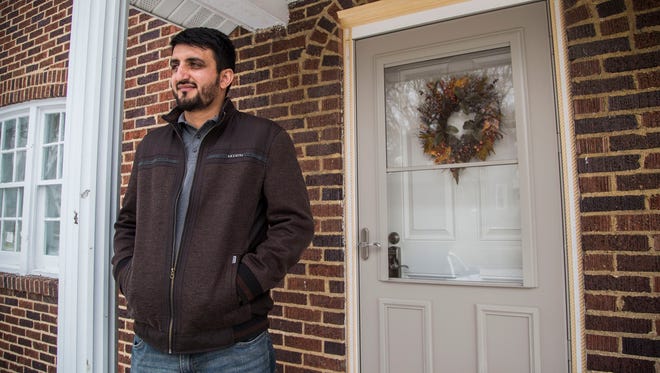Zalmay Niazy of Iowa Falls helped interpret for U.S. forces in Afghanistan. But after six years in Iowa, his plea for asylum has been denied for a ludicrous reason as the law allows.
Rekha Basu
Des Moines Register
From Afghan translator to small-town Iowa handyman
If you’re not convinced we need to revamp U.S. laws on who gets to enter, work, live and find legal sanctuary in this country, look at the crisis facing Afghan-born Iowa Falls resident Zalmay Niazy. His plight sharply illustrates how our decisions to wage war thousands of miles away can endanger allies' lives at the other end. And it cries out for fixing the fact that service to our nation by foreigners living under terrorism is too often punished rather than rewarded.
Niazy, who goes by Zee, was born to professional parents, and educated in private schools to serve as an English-language interpreter. During “Operation Enduring Freedom” — the Bush administration’s military response in Afghanistan and elsewhere to the Sept. 11 attacks — he interpreted for our forces. Beginning at age 19 in 2007, he spent three years helping them fight the Taliban by scanning radio signals, writing up reports on their internal communications, and translating for coalition forces. That put him in life-threatening situations and led to injuries and threats from the Taliban, which also killed his uncle, his Des Moines lawyer says.

Zee later got other employment, which led to his attending a conference in Washington, D.C. in 2015. While here, he applied for political asylum under a program created especially for foreign interpreters for U.S. military. He learned the Taliban was tracking him abroad with threats and his parents feared he’d be killed if he returned home.
Political asylum is selectively awarded to foreign nationals who can demonstrate a well-founded fear of persecution in their homelands based on their political affiliation or membership in a marginalized group. Applicants are allowed to stay in the U.S. while awaiting a decision. In Zee’s case, that took four years to come, from the time he was granted an interview after appealing for Sen. Chuck Grassley’s intervention at a 2017 town hall.
In the meantime, Zee created and runs a handyman business, and he bought and renovated a home.
Yet last month the Department of Homeland Security denied him asylum, for a reason so unfair it’s almost laughable. As his lawyer Keith Herting tells it: “When he was 9, the Taliban came to his home. They threatened to burn his house down if he didn’t give them food, (so) his mom gave him bread to take to the fighters.” In his interview with Homeland Security officials, Zee told about that incident in answer to a question on whether he had ever had direct contact with the Taliban.
They used it against him, claiming it showed he’d been “providing material support to terrorists.” They also said he had shown no real threat of persecution, he said in a June 10 interview on Iowa Public Radio’s "River to River":
“I said, ‘I fought this group. How can I be engaged in their activities?’”
The material-support statute, elements of which were in the 1990 Immigration and Nationality Act signed by Bill Clinton, were barely invoked until passage of the 2001 USA Patriot Act. It makes it illegal to provide assistance to any group the U.S. government considers a foreign terrorist organization. But the precedent-setting asylum denial came in 2018 under the Trump administration, after Trump had campaigned pledging to use it more broadly. “In the Matter of A.C.M.” involved a Salvadoran woman who was enslaved by a paramilitary group and escaped, says Herting:
“The Department of Justice said while she was enslaved, she cooked and cleaned for the terrorists,” concluding she provided them material support, he said. That concept has since been applied in a number of other cases, as documented by the New Yorker magazine.

“His story is so overwhelmingly unimpeachable,” said Herting of Zee, “that I would hope there would be some decency or rationality. But I haven’t seen a ton of evidence to suggest that exists.”
More:Basu column: An Iowa City 'Documented Dreamer' tells a U.S. House panel about her plight, shared by 200,000 others
Herting challenges Grassley's contention that he can do nothing because it’s a law. The senator can push to change the law, he says.
Zee will appear June 28 before an immigration appeals court in Omaha to plead his case. A GoFundMe account has been set up for his legal fees.
More broadly, Congress must immediately set about getting rid of or modifying the material support law. That, by the way, doesn’t apply to domestic terrorist groups revealing its underlying bias. Donald Trump leaned on it to ban travel from Muslim countries. He also made asylum the only grounds for foreigners presenting at the border to seek permission to stay, and reduced the number of refugees permitted in annually. Some of his moves have been relaxed under Joe Biden, but there’s much more work to do on immigration law.
In a pointed CNN commentary about Vice President Kamala Harris’ visit to Central America to address the issues that prompt people to leave their countries, Mari Aponte, a former ambassador to El Salvador, wrote:
“The enforcement-first immigration strategy has failed us in the past. Instead of a heated rhetoric that paints immigrants as dangerous, we need real, evidence-based solutions that get at the heart of why migrants leave their homes and make the trek to the U.S.”
That would surely apply to Zalmay Niazy, whose home country the U.S. has had its fingers all over for decades. Now we're pulling out, leaving many who supported us at risk of reprisals from the Taliban. If his plight matters to you, stand up and support Zee’s claim for asylum, and ask Grassley and Sen. Joni Ernst to do the same — and then change the law.
No comments:
Post a Comment